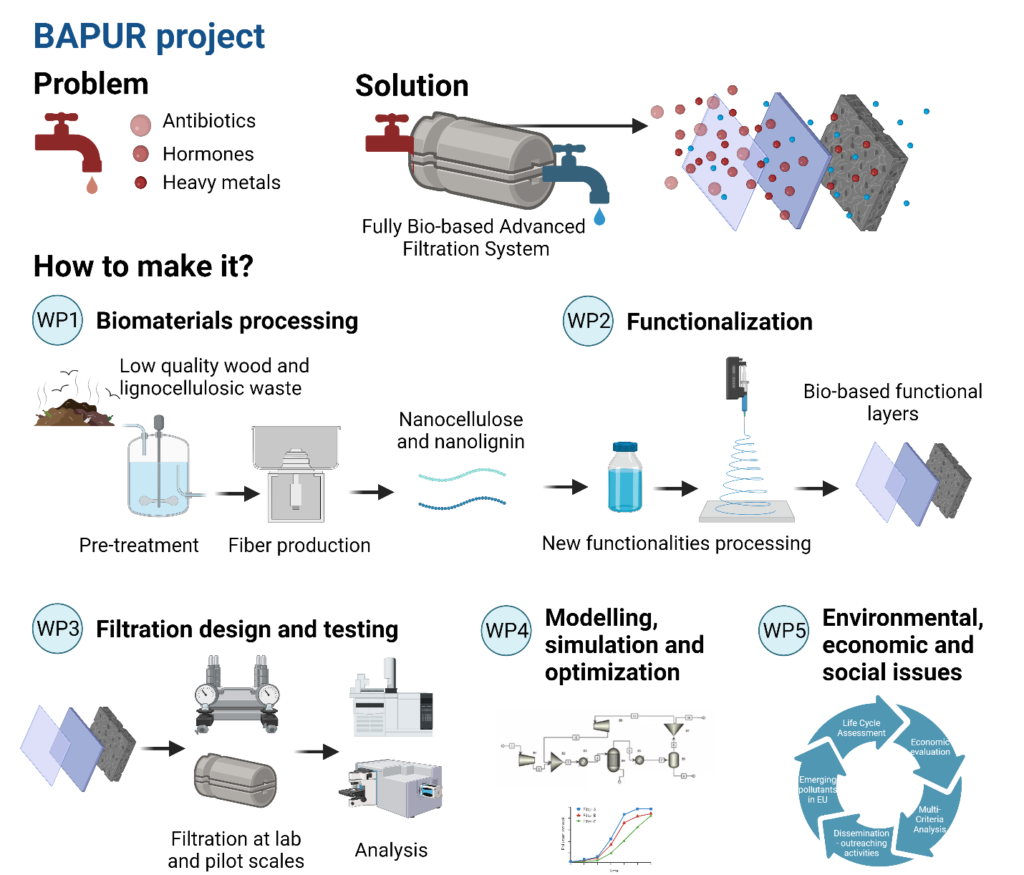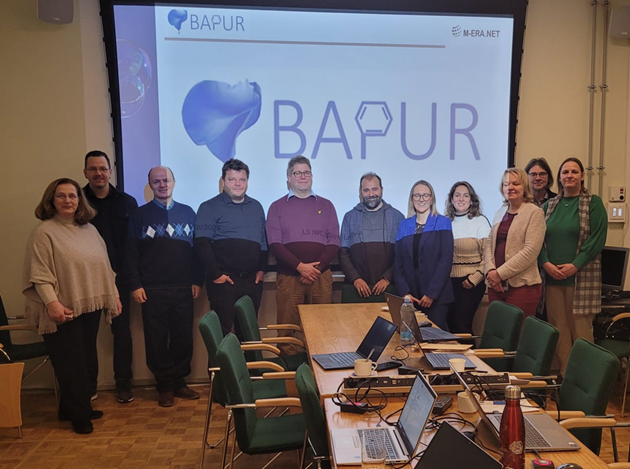The Consortium
BAPUR Project is an M-ERA.net initiative carried out by a consortium of five partners with a specific work plan each, including the bioprocessing (WP1), functionalization (WP2), filtration design and testing (WP3), modelling, simulation and optimization (WP4), environmental, economic and social issues (WP5) and management and coordination of the entire project (WP6). The basic concept of the project has been verified on the laboratory scale (TRL3), and the target technology readiness level is 6 (six) – Full-scale prototype, Field demonstration.

Partner 1 – University of Cantabria, Spain (Coordinator)
The University of Cantabria, in northern Spain, is the project’s coordinator. The research group Green Engineering and Resources with an expertise on synthesis, analysis, simulation and optimization of systems that include interconnectivity with available energy and material flows, from the Chemistry and Processes & Resources Department takes the lead on BAPUR Project, coordinating and participating with specific tasks.

The main interests related to the project are:
- New pre-treatment methods of wood and lignocellulosic biomass (deep eutectic solvents and new alkaline hydrolysis processes using waste materials) at TRL5 to be used in other companies related to lignocellulosic materials
- New analytical techniques for the analysis of pollutants at very low levels (LIBS for heavy metals, and RAMAN with novel SERS mechanisms for hormones, pharmaceutical, and agrochemical products) for the Government and the wastewater managers
- New software tools and models for simulation, optimization, and automisation of the processes in biorefineries
Partner 2 – University of Tomas Bata, Czech Republic
The University of Tomas Bata in Zlín partners through the Centre of Polymer Systems (CPS), with an expertise on research and development in the field of polymer sciences with an emphasis on sustainable development.

The main interests related to the project are:
- New nanocellulose and nanolignin products in the form of functional additives to polymer electrospun polymer filtration membranes for pollutants removal from water. The nanocellulose and nanolignin products can be utilized as functional polymer fillers or densifiers in the case of water-soluble systems (application e.g. in cosmetics) at TRL 5
- New functional nanofibers for emerging pollutants removal possibilities for industrial partners, including electrospinning techniques. Nanofibrous nonwovens will be the building block for the filtration system assemble. Nanocellulose and nanolignin-modified nonwovens will be the subject of application screening in the area of functional textiles. A TRL 5 will be studied
- New filtration units and designs based on fully bio-based materials in the form of the prototype assembly and testing. The feedback from the testing stage will be used for the further optimization step of the newly designed prototype. Nedform s.r.o. company as part of the Steering Committee of the BAPUR project is a partner interested in the commercialization of the project outputs. A TRL 6 will be done.
Partner 3 – University of Ljubljana, Slovenia
The University of Ljubljana partners through the Biotechnical Faculty, with an expertise on the study of natural resources and their sustainable management.

The main interest related to the project is:
- New pre-treatment methods of low-quality woody biomass by treating wood particles with wood degrading fungi and the use of new functionalized nanocellulose and nanolignin as fillers, densifiers, or reinforcement agents to be used in other companies related to lignocellulosic materials at a TRL5. For the analysis of pollutants at very low levels new analytical methods (GC-MS, HPLC) will be used. Melamin, d.d. company as part of the Steering Committee of the BAPUR project is a partner interested in the commercialization of the project outputs.
Partner 4 – Latvian State Institute of Wood Chemistry, Latvia
The Latvian State Institute of Wood Chemistry with expertise on various scientific disciplines, including, chemistry, biology, materials science.

The main interests related to the project are:
- New pre-treatment methods of woody biomass. Steam explosion process and optimization methods can be used by industrial partners at a TRL 5
- New materials based on with fungi mycelium can be used in the final layers of the filtration units.
Partner 5 – Åbo Akademi University, Finland
The Åbo Akademi University, located in Turku and partnerts through the Laboratory of Molecular Science and Engineering with expertise in five major disciplines: Analytical Chemistry, Inorganic Chemistry, Organic Chemistry, Physical Chemistry, and Polymer Technology.

The main interests related to the project are:
- Pressurized hot water extraction methods. These methods can also be used by industrial partners in the future.
- New analytical methods for the analysis of pollutants at very low levels and the analysis of biomass products with advanced characterization methods. MS (QQQ, tof ion trap, MALDI), Size-Exclusion (UV, RI. LS, MALLS, MS), NMR, DSC, TGA, or Pyr-GCMS can be used, and new filtration units and design based on 3D printing. In this case with a very strong collaboration with UTB-CPS partner.

